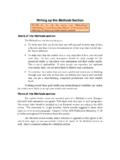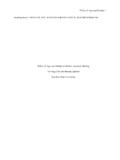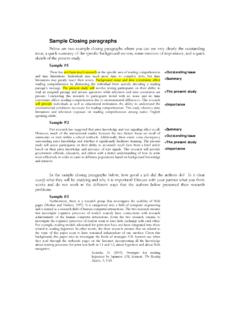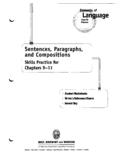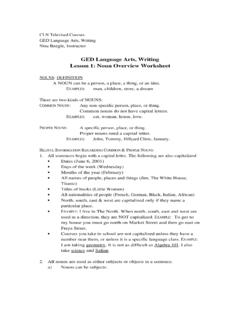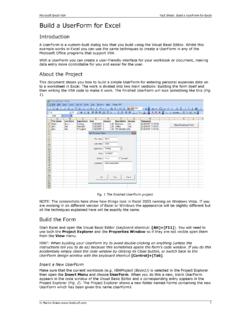Transcription of Task 1 - Mike Dillinger
1 TTaasskk 11:: FFoorrmmuullaattee yyoouurr rreesseeaarrcchh pprroobblleemm More info Page Deliverables for this Task Hand in a copy of your Team Datasheet. 14 Hand in your Research Problem worksheet . 26 Hand in a list of at least 10 references, in APA-format, to empirical articles related to your research problem. See Task 2 for more information about finding and formatting your references. How to do this task, step by step Choose an approach for your research problem 3 Understand the parts of a research problem 9 Identify who you will collaborate with 13 Identify the process and sub-process that you want to study 15 Identify two factors that you think affect your sub-process 17 Identify who you want to study 19 Identify how you think your sub-process will change 20 Describe why your problem is important 21 Describe your research problem 24 Think ahead 27 Glossary 29 Further Resources 30 Appendices: Appendix A: Sample Research Problems 31 Hands-on Research Methods ( Mike Dillinger 2008) Task 1 p.
2 1-1 Overview One of the requirements for this course is that you do your own research project plan it, collect the data, analyze it, and present everything on a topic that interests you and is related to your professional activities, , something that you may find useful to know in the future. In addition, you will have to carry out this research project in collaboration with a partner: teamwork is essential in research. Your first task together is to decide on what exactly you will study: you have to formulate your research problem. This Task Package will walk you through the steps to formulating a focused, researchable problem. There is a section on each of several questions that you should answer to explain what your specific research problem is. Remember that for Task 1, you ll develop a preliminary, draft version of your research problem that you ll rethink and revise afterwards.
3 Call this your working version of the research problem. In Task 2, by looking at published research on the same problem, you ll be able to revise, improve, and sometimes even abandon your research problem. Similarly, in Task 3 you ll work out the methododogical details of your experiment and that will help you revise and improve the way you understand your research problem. To do this task step by step to formulate your research problem , you will need to answer several questions, even if for now you only provide a guess. The later sections of this task package go into these topics in more detail. For starters, you may want to browse through the sample research problems in Appendix A, if only to get an idea of where this task will lead you. Here s a brief breakdown of the information you ll need to gather to formulate your research problem: 1.
4 Which approach will you use? This course emphasizes the scientific approach: empirical research based on experimentation. You might also do scholarship, descriptive research, industrial research or use other approaches. When you choose to work within a discipline (such as Psychology) or area (such as Cognitive Psychology), you usually adopt the preferred approach of that area. [See approach] ContentsApproachProcess/Sub-processFacto rsParticipantsChangesDeliverables Team Data Problem WorksheetThink aheadSample ProblemsGlossaryResourcesapproach - The collection of assumptions, techniques and background knowledge that guides a researcher s choices in what to study and how to study it. empirical research - Systematic learning through studying data. Experimental research is one kind of empirical research that uses experimental methods. 2. What are the parts of a research problem?
5 You need to define different pieces of information to describe a research problem. [See parts] 3. Who will you work with? You need to choose a partner. [See collaboration] Hands-on Research Methods ( Mike Dillinger 2008) Task 1 p. 1-2 4. What process are you studying? What sub-process or part of the process will you focus on? [See process] 5. What factors affect this sub-process? [See factors] Different things can make the sub-process more frequent or more error prone or more variable. There may be several of these factors. You will only study two, but it is good to identify others. 6. Who do you want to observe carrying out this sub-process? [See participants] Maybe you want to compare two different groups of people: which groups and why? 7. What kind of effects will your factors have? The factors should make the process or its outcomes different. Which differences do you think you will find?
6 [See effects] 8. Why bother studying this? The people who read about your research need to understand why this problem is important and who should care about it. [See importance] Choose an approach for your research problem This textbook is about doing empirical research with experiments, so your general approach to research has already been chosen by your professor. It s important for you to know about other options and to continuously ask about their advantages and disadvantages. The way that you chose and formulate problems for study is influenced by the general approach that you take to finding out information. The approach that you choose will determine where you will look for information, what kinds of data (if any) you will consider, who is likely to read your results, etc. Three approaches are described here: scholarship, theoretical research, and empirical research. ContentsApproachProcess/Sub-processFacto rsParticipantsChangesDeliverables Team Data Problem WorksheetThink aheadSample ProblemsGlossaryResourceseffects - Researchers predict that changes in a factor will have certain measurable effects on a process.
7 The effects correspond to the dependent variables. process, sub-process - One of the psychological activities that underlie process behavior. A sub-is one step or phase in a multi-step process. factor(s) - Some characteristic(s) that the researcher suspects can causes changes in the sub-process. The factors correspond to the independent variables. You choose an approach in the first place by choosing a major or discipline. Different disciplines will use different approaches to study the same thing. For example, linguists, cognitive psychologists, computer scientists, neurologists, language teachers, and sociologists might all study language, but they ll use quite different approaches. Linguists, language teachers, and sociologists rarely do experiments, and computer scientists rarely do experiments with human participants. Neurologists do more case studies and focus on people with pathological conditions.
8 Cognitive psychologists usually focus on normal adults and use experimental methods. When you choose a discipline, like Psychology, and a field within that discipline, like Cognitive Psychology, you usually adopt the preferences of the other researchers in that field. Still, regardless of the differences in approach, researchers in all of these Hands-on Research Methods ( Mike Dillinger 2008) Task 1 p. 1-3 fields are still studying language. The way you formulate your research problem will lead you to more specific choices and make your approach more precise. Most of what is done under the name of research in high school and other classes is what is more technically called scholarship . Scholarship focuses on finding, documenting, and organizing other people s information. If you follow this approach, you will formulate your problem in terms of existing information about topics that other people have studied and you will use their data.
9 Scholarship adds value to existing information by organizing and evaluating it to make it easier for others to understand and use. Research is different because it focuses on having you generate new information of your own, often about a problem that other people have not yet studied. Theoretical research emphasizes generating new information by thinking about existing data in new ways. If you do this kind of research, you will formulate your research problem in terms of evaluating how coherent and reliable different ways of thinking ( , hypotheses or theories) are, given existing data. One problem with this kind of research is that very often the existing data are only indirectly related to the research problem that you want to solve. In this case, you often cannot draw very strong or very reliable conclusions. Empirical research, on the other hand, emphasizes collecting new data about what happens in the world (empirical comes from the Greek word for personal experience), data that is specifically chosen to help evaluate specific ways of thinking ( , hypotheses or theories).
10 The big advantage of this kind of research is that the data is custom tailored to be as relevant and reliable as possible for testing a given hypothesis. This means that you can draw much stronger and more reliable conclusions with this approach. It also means that you are not limited to studying problems that other people have investigated: you can develop your own ways of producing data for whatever problem you choose. Experimental research is one kind of empirical research the kind that uses a particular, more rigorous procedure for data collection called an experiment. See Task 4 for more information about what makes experiments different. Your research project this semester will be a piece of empirical research that you will plan, collect data for, and report on. Science. Notice that we defined all of the approaches above in terms of how ways of thinking (hypotheses, theories, organization) are related to observable data.
